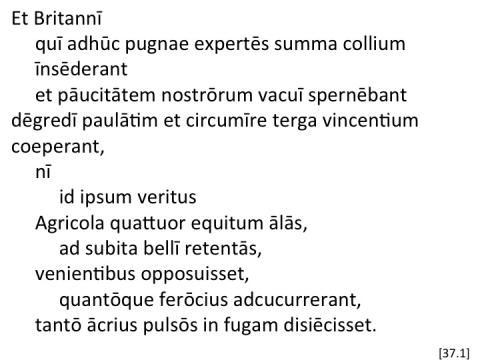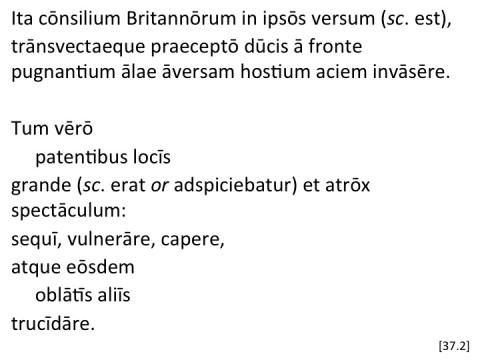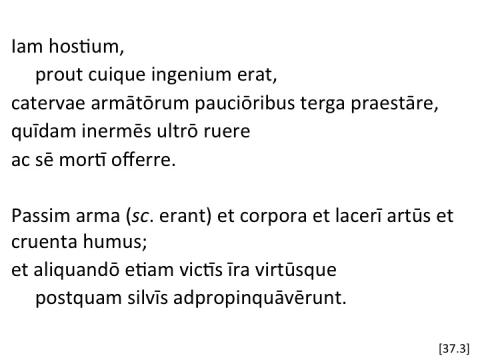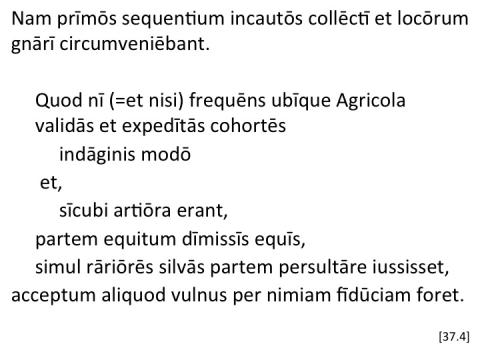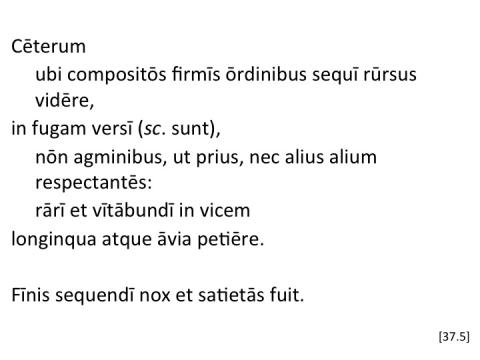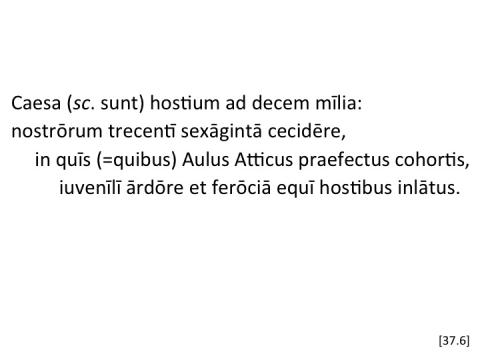Overview: The British reserves attempt a flank movement, but are put to flight by a counter attack of cavalry; the rout becomes general; the Britons make a stand in the woods, but are speedily dislodged; they flee in utter demoralization; the loss on each side. (Stuart); this chapter begins on f. 62v of the codex Aesinas.
37.1
summa collium: See note on 12.4 extrema. (Pearce)
vacuī: “standing at ease.” (Stuart); “idly”; explained by pugnae expertes (Pearce)
vincentium: significantly used for victorum, for the action of the Britons showed that they at least did not as yet admit that the Romans had won successes so far. (Gudeman)
coeperant, nī ... opposuisset: a concise way of stating that the movement actually begun (hence indicative coeperant) was checked, see note on 4.4. The full expression of the thought would require et circumissent after coeperant, but the narrative would be much less vigorous. (Pearce) [A&G 517 with note] circumīre ... coeperant: i.e. et circumissent ni. On this brachylogy, see Introd. p. xxxii #6.a. (Gudeman)
quattuor ... ālās: these four squadrons of cavalry had also been pugnae expertes. They are especially mentioned here, because they were probably not a part of those referred to as forming the acies; see note on 35.2 (Gudeman)
ad subita bellī: “for a sudden emergency.” The substantival use of neuter plural adjectives is perhaps more frequent in Tacitus than in any previous writer save Seneca; the phrase itself is a vox Liviana. (Gudeman)
37.2
versum: sc. est. (Damon)
trānsvectaeque: -que appends a sentence explanatory of consilium. (Pearce); the clause here is added paratactically to the effect, in place of a clause with cum. (Gudeman)
aversam hostium aciem: "the rear of the enemy's line" (Woodman and Kraus).
spectāculum: the following word picture falls into two parts: (1) The rout on the battlefield; (2) the pursuit in the woods. (Stuart); sc. adspiciebatur. On this ellipsis, see below and Introd. p. xxxi #6.a. (Gudeman)
atque: on the collocation, the last member being amplified and therefore joined by a conjunction to a preceding asyndeton, see Introd. p. xxviii #11.c. The entire passage is clearly modeled upon Sall. Iug. 101.11. (Gudeman)
eōsdem: the disabled captives. (Stuart)
37.3
hostium: though belonging to armatorum, which by its independent position is the more effectively contrasted with inermes, is here placed at the beginning because it depends on both catervae and quidam, which are in turn in antithesis. (Gudeman)
terga praestāre: a new expression coined to avoid the stereotyped phrase, terga dare, praebere. On this peculiarly Tacitean aversion for hackneyed phrases, see Introd. pp. xxv, xxxv #7. (Gudeman)
arma ... humus: observe the effect of the polysyndeton, bringing each single element into prominence. See Introd. p. xxvii #10. (Gudeman)
aliquandō ... virtūsque: sc. redit. (Gudeman) victīs: those who had fled with their arms (catervae armatorum) when in the open, made a stand in the shelter of the forest. (Stuart)
adpropinquāvērunt: the subject is Romani. Idem refers to victis (Pearce); sc. Britanni, easily supplied from the preceding victis, and made necessary by the context. (Gudeman)
37.4
prīmōs sequentium: opposed to collecti; incautos to locorum gnari. (Pearce) prīmōs sequentium incautōs: "the first, incuatious, pursuers," i.e., those Roman soldiers who festinatione victoriae incautiously followed the fleeing enemy in advance of the pursuing cohorts, the Britons, etc.; the irregular word order was caused by a desire for succinct and rhythmical expression. On use of the adjective (incautos) for the adverb, see note ch 5.2. (Gudeman)
quod nī: for quod, see note on 16.2. (Pearce)
frequēns: like 20.2, multus in agmine. (Pearce) frequēns ubīque: "who was everywhere conspicuously active"--the phrase is pleonastic, for the sake of emphasis. See note ch. 22.3. (Gudeman)
validās ... iussisset: both foot and horse are employed in this service. (Pearce) indāginis modō: “after the manner of a cordon.” The figure is taken from hunting, the wild beasts being driven into one spot and surrounded by nets. (Gudeman) rāriōrēs: “the more open parts”; balancing sicubi ... erant. (Stuart) persultāre: “to range”; in this sense applicable both to horse and foot. (Stuart); “to scour, roam over.” (Gudeman). The clause as a whole may be translated as follows: "And, had not Agricola (who was in constant attendance everywhere) ordered the strong light-armed cohorts to act in the mnner of a cordon and some of the cavalry to dismount and scour any denser areas that there were and others <to scour> the sparser woods ..." (Woodman and Kraus).
acceptum aliquod ... fīdūciam foret: the participle is unusually far removed from its auxiliary, probably here for the purpose of securing alliterative groups. (Gudeman)
vulnus: “damage.” This figurative sense of vulnus, especially frequent with accipere, is a euphemism for clades. (Gudeman)
37.5
compositōs: supply Romanos. (Stuart) compositōs ... ōrdinibus: i.e. when it was seen that the Romans had recovered from the confusion into which they had been thrown, and were again pursuing in battle array, etc. (Gudeman)
versī = se verterunt. See note ch. 18.1. (Gudeman)
alius alium respectantēs = in vicem respectantes. ... In Tacitus only here, and used to avoid the repetition of invicem or inter se. (Gudeman)
rārī: adversative asyndeton. Insert “but” in translating. (Stuart); on the ellipsis of sed, see Introd. p. xxxi #11.b. (Gudeman) rārī et vītābundī in vicem: repeats in an affirmative form non agminibus nec alius alium respectantes. (Pearce) in vicem: for the classical inter se, see note on 6.1. (Pearce)
fīnis ... satietas fuit: “Night and repletion put an end to the pursuit.” On the singular predicate, see note ch. 4.3. (Gudeman) nox et satietās: concise combination of an external and an internal cause for ceasing from the pursuit. (Pearce); see on ch. 25.1. (Stuart)
37.6
caesa hostium ... cecidēre: ancient historians generally shrink from giving an exact number of the fallen in battle, even when such was ascertainable. They prefer a round number instead, usually more or less exaggerated, or else they refrain from mentioning any. ... The Roman loss of 360 is perhaps authentic, the information being probably due to Agricola himself. On the repetition of the verb, see note ch. 32.3. (Gudeman) decem mīlia ... trecentī sexāgintā: the great disparity is probably due to the fact that the number of Roman slain rested on official reports, that of the enemy largely on a rough estimate. (Stuart)
quīs: an archaic form for quibus. (Stuart) in quīs: Tacitus had spoken (ch. 35.2) of the glory of winning a victory without loss of Roman blood. The fate of this prefect is incidentally noted as the only apparent exception, for even his death was due to a mere accident. A modern writer would probably have mentioned this in a footnote. (Gudeman)

